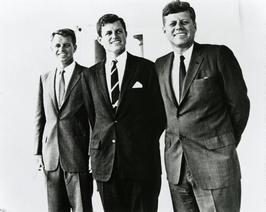| The Kennedy Brothers |
| ||| HOME |||JFK |||RFK||| THE KENNEDY FAMILY |
 The Kennedy brothers had unbridled ambition and believed that they could do almost anything they wanted to. In a way, they had a wanton kind of arrogance, making them feel above the law. They no doubt saw themselves running America for at least sixteen, possibly twenty-four years. John would hand over the reins of power at the end of two terms to Robert, who would, after his two terms as President, hand the office over to Ted. They were young, misguided, reckless and, in the case of John, had deep psychological problems. His womanizing to a pathological extreme was a sign of this. He had numerous affairs in office with many women. The list included Marilyn Monroe; Judith Exner; Ellen Rometsch, a young refugee from East Germany; Mary Pinchet Meyer, ex-wife of Cord Meyer, and icon of stage and screen, Marlene Dietrich. The Kennedy brothers had unbridled ambition and believed that they could do almost anything they wanted to. In a way, they had a wanton kind of arrogance, making them feel above the law. They no doubt saw themselves running America for at least sixteen, possibly twenty-four years. John would hand over the reins of power at the end of two terms to Robert, who would, after his two terms as President, hand the office over to Ted. They were young, misguided, reckless and, in the case of John, had deep psychological problems. His womanizing to a pathological extreme was a sign of this. He had numerous affairs in office with many women. The list included Marilyn Monroe; Judith Exner; Ellen Rometsch, a young refugee from East Germany; Mary Pinchet Meyer, ex-wife of Cord Meyer, and icon of stage and screen, Marlene Dietrich.
Both JFK and RFK conducted affairs with Marilyn Monroe in the early 1960s, which proved to be dangerous, as Marilyn was deeply depressed when the brothers cut all ties with her, fearing that she would expose their affairs, prompting them to make sure that she wouldn’t talk by blackmailing her with compromising pictures taken of her whilst intoxicated during a visit to the Cal-Neva Lodge. If she talked, the pictures would no doubt be on the front page of every newspaper within hours. The following weekend, Marilyn was dead, sparking speculation that the Kennedy brothers either sparked her suicide, or arranged for her death to silence her forever. In her interview with Larry King, Judith Exner said, “I think that Jack was very reckless. He took tremendous chances in many areas, not just with me. But I think that’s the way he was brought up. I think that Jack emulated his father a great deal and in many ways.”
In their three years of power, the Kennedy brothers had made more enemies than any political partnership in American history. So was it conceivable that the murder of the President of the United States could have originated from the underbelly of America’s society through the intrigue and planning of the Mafia. Top mob members wanted Robert Kennedy and later John Kennedy murdered. First, they were outraged at what they perceived as the brothers' hypocrisy, and second, they were alarmed at the increasing danger of being further investigated and prosecuted. The hypocrisy they saw derived from their notion that Joseph Kennedy's history with organized crime figures plus some racketeers' support of JFK's election warranted protection from, not their selection for, aggressive prosecution. This compromising history was compounded by the administration's use of mob members in its attempts to deal with Fidel Castro. The U.S. Government personnel plotted to kill Castro from 1960 to 1965. American underworld figures and Cubans hostile to Castro were used in these plots and were provided encouragement and material support by the U.S. They delivered, and they expected appropriate acknowledgment of their cooperation. Rather than laying off, the Justice Department was piling on. Major mob leaders were outraged and planned revenge. |
 The brothers were taking on the Mob, the CIA, the military and big business.
The brothers were taking on the Mob, the CIA, the military and big business.  The Kennedy brothers were seen by some, as immature and at times cruel. This is evident in the dismissal of
The Kennedy brothers were seen by some, as immature and at times cruel. This is evident in the dismissal of